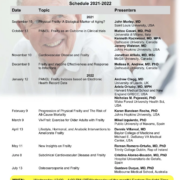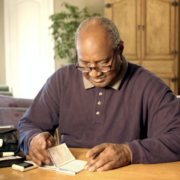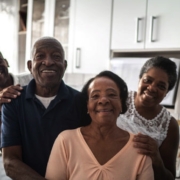Taking LGBTQ+ Health to Heart: An Interview with Dr. Carl Streed, Jr., on LGBTQ+ Older Adults, Heart Health & Frailty
 For “Pride Month,” we wanted to focus on Lesbian, Gay, Bisexual, Transgender, and Queer+ older adults’ heart health as a possible risk consideration for frailty.
For “Pride Month,” we wanted to focus on Lesbian, Gay, Bisexual, Transgender, and Queer+ older adults’ heart health as a possible risk consideration for frailty.
There is increasing recognition of a multitude of health inequities that exist across many areas of wellness for LGBTQ+ people throughout the lifespan. In addition to age-related changes in cardiovascular risk, older LGBTQ+ adults are at high risk for poor heart health outcomes related to LGBTQ+ specific life stressors and psychosocial, behavioral, and physiologic factors. Further considerations include increased prevalence of diabetes, tobacco abuse, and the use of hormonal therapies in transgender individuals.
Stemming from their lived experiences, or perceived and actual discrimination from present day physicians, many LGBTQ+ older adults mistrust health care providers; consequently, delaying doctor visits may lead to an LGBTQ+ patient being diagnosed when they present with overt clinical disease rather than an early disease stage, where institution of preventative measures may impact patient care.
Last June, the New York Times ran a story titled, “Why L.G.B.T.Q. Adults Are More Vulnerable to Heart Disease” that interviewed several high-profile cardiology researchers and experts on LGBTQ+ health. Among them were Dr. Erin Michos, a current cardiologist at Johns Hopkins Medicine who is also affiliated with the American Heart Association, and Dr. Carl Streed, Jr., who attended medical school at Johns Hopkins University and completed his internal medicine residency at the Johns Hopkins Bayview Medical Center. Dr. Carl Streed, Jr., is now an Assistant Professor at Boston University Chobanian and Avedisian School of Medicine and the Research Lead for the GenderCare Center at Boston Medical Center.

Dr. Carl Streed, Jr.
For this blog, Dr. Streed kindly answered a few questions on this topic, keeping in mind the context of frailty research.
Tony Teano: With regard to function, how may poor coronary/vascular health lead to frailty?
Dr. Streed: Poor heart health limits the ability to engage in physical activity that reduces the likelihood of frailty. It also limits additional activities, such as community engagement, that are protective against frailty.
Tony Teano: Within the LGBTQ+ community, are some sexual minorities and gender diverse/expansive people more at risk than others?
Dr. Streed: LGBTQ+ communities are not homogenous and so have significant variation in risk factors for CVD and outcomes. Additionally, persons with multiple marginalized identities can face significant disparities in CVD risk and outcomes (e.g., Black cisgender lesbians, Black transgender women, etc.). There are unique minority stressors that lead to differences in coping mechanisms as well as physiologic changes in response to stress.
Tony Teano: What are the top few things physicians can do to better evaluate LGBTQ heart health?
Dr. Streed: Improved Sexual Orientation and Gender Identity (SOGI) data collection could help. Also, improved training of clinicians and improved screening of stressors unique to LGBTQ+ persons may make a difference.
Tony Teano: What interventional steps might LGBTQ+ older adults consider taking above and beyond those for the general population?
Dr. Streed: I would advise to get connected to community, especially through LGBTQ+ community centers. Engagement in any physical activity, especially that which improves daily function can also help, as can getting connected to cessation programs tailored for LGBTQ+ persons if you are still smoking.
Many thanks to Dr. Streed for taking the time to answer these questions. For more information on these matters, please see the following related research and news:
- Preventing cardiovascular disease among sexual and gender minority persons
- Cardiovascular health concerns in sexual and gender minority populations
- Assessing and Addressing Cardiovascular Health in LGBTQ Adults – Professional Heart Daily | American Heart Association
- LGBTQ+ People Encounter Barriers to Successfully Quitting (Smoking/Tobacco)
- Assessing and Addressing Cardiovascular Health in People Who Are Transgender and Gender Diverse: A Scientific Statement From the American Heart Association
Right now, there is not an abundance of frailty research on LGBTQ+ older adults. However, Johns Hopkins investigators are making strides to contribute to our understanding of aging research among marginalized populations. For example, the JHU Diversity Leadership Council funded a crowd-sourced grant that Frailty Science team member Brian Buta, MHS, pitched earlier this year (about which you may find a related blog here). Over the spring term, this Diversity Innovation Grant (DIG) helped train 20 research coordinators, scientists, and staff to be more culturally competent at recruiting diverse older study participants. “This is a first step towards improving diversity in aging research at Johns Hopkins, and staff from the Schools of Medicine, Nursing, and Public Health participated in it” said Mr. Buta, adding that the training “covered historical and societal barriers to participating in research among racial/ethnic and sexual and gender minorities. Being aware of such barriers and understanding the importance of treating potential research candidates from these communities with dignity and respect, especially during the recruitment stage, is critical to achieve diverse representation in our research studies, and ultimately, to meet the health needs of those who are most vulnerable.”
The Center on Aging & Health (COAH)’s DIG training builds upon another DIG training from the JHU Division of Geriatric Medicine and Gerontology’s Mosaic Initiative collaboration with Medicine for the Greater Good, “Geriatricians Engaged and Ready for LGBTQ+ Aging, Health & Wellness” (“GEARed”—about which you may learn more here). GEARed trained 18 geriatric faculty and staff in 2022, and the team continues to hold quarterly meetings, and updates are reported at faculty meetings. Also, this year, the JHM Office of Diversity, Inclusion & Health Equity relaunched their “Proud Partner” training—an interactive LGBTQ+ allyship educational offering to improve the ability to interact with and support our LGBTQ+ patients, learners, and co-workers—available to Johns Hopkins faculty and staff through MyLearning in the JHU portal. Moreover, JHU/JHM is taking an active role in transforming LGBTQ+ heath care.
Division of Geriatric Medicine and Gerontology’s Mosaic Initiative collaboration with Medicine for the Greater Good, “Geriatricians Engaged and Ready for LGBTQ+ Aging, Health & Wellness” (“GEARed”—about which you may learn more here). GEARed trained 18 geriatric faculty and staff in 2022, and the team continues to hold quarterly meetings, and updates are reported at faculty meetings. Also, this year, the JHM Office of Diversity, Inclusion & Health Equity relaunched their “Proud Partner” training—an interactive LGBTQ+ allyship educational offering to improve the ability to interact with and support our LGBTQ+ patients, learners, and co-workers—available to Johns Hopkins faculty and staff through MyLearning in the JHU portal. Moreover, JHU/JHM is taking an active role in transforming LGBTQ+ heath care.
Finally, you may be interested in past COAH & Frailty Science blogs on LGBTQ+ older adults:
- Top 10 Recommended Resources About LGBTQ+ Aging & Older Adults – Center on Aging and Health (jhu.edu)
- Frailty in LGBTQ+ Adults: notes from a conversation with Dr. Karen Fredriksen-Goldsen | Frailty Science
Many thanks to Dr. Monica Mukherjee with the Johns Hopkins University Division of Cardiology for providing editorial input for this blog.





